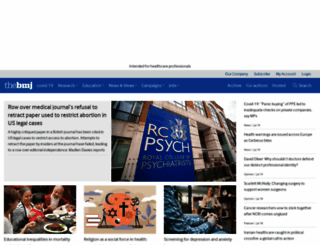The BMJ: Leading Medical Research, News, Education, Opinion
Page Load Speed
1.8 sec in total
First Response
151 ms
Resources Loaded
628 ms
Page Rendered
1 sec

About Website
Visit bmj.org now to see the best up-to-date BMJ content and also check out these interesting facts you probably never knew about bmj.org
High impact medical journal. Champion of better research, clinical practice & healthcare policy since 1840. For GPs, hospital doctors, educators, policymakers.
Visit bmj.orgKey Findings
We analyzed Bmj.org page load time and found that the first response time was 151 ms and then it took 1.6 sec to load all DOM resources and completely render a web page. This is quite a good result, as only 35% of websites can load faster.